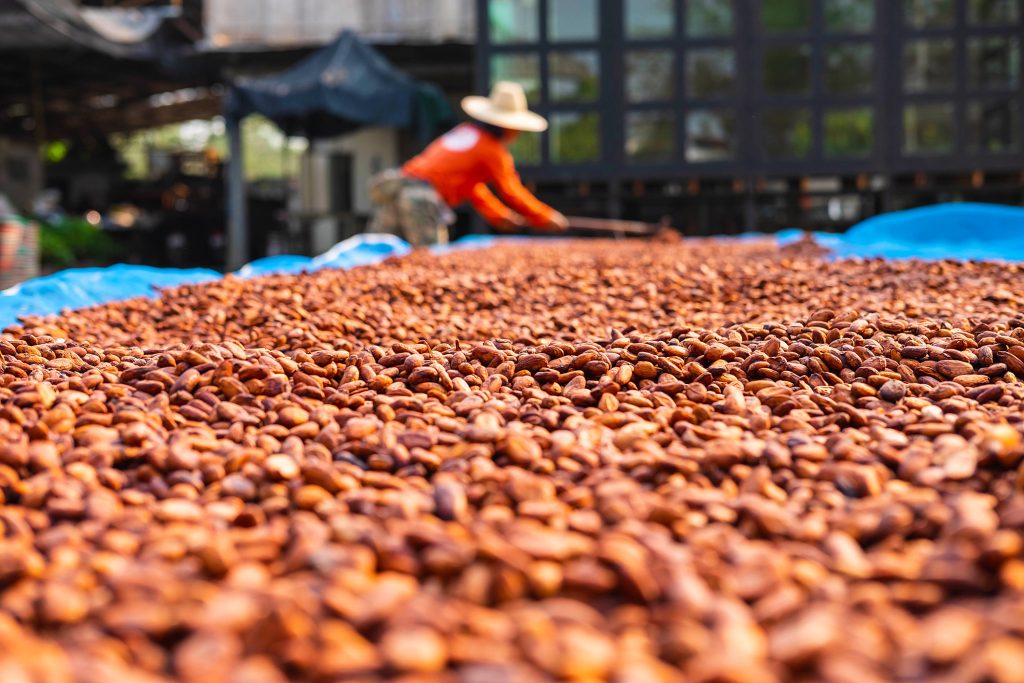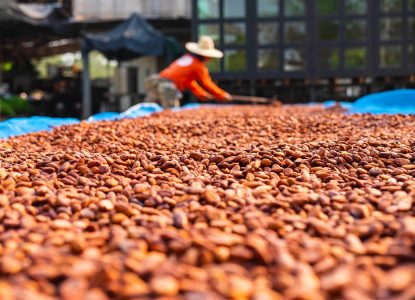By Michael Ehis Odijie, University College London
– – –
The connection between imperialism and cocoa production in West Africa is direct. From the 19th century onwards, European colonial powers established their African colonies to serve as sources of raw materials such as cotton, coffee, and cocoa. This process often involved the use of force and disrupted the local economy. For instance, the emphasis on cash crops like cocoa, which were not consumed locally, redirected labor away from food crops. This change contributed to numerous famines and led to an untold number of deaths in many African countries.
The disconnect between production and food consumption remains evident in Africa today. Ivory Coast and Ghana, the world’s largest cocoa producers, simultaneously export raw cocoa beans while being net importers of staple foods such as rice and wheat.

Another crucial aspect of the colonial restructuring of Africa’s economy lies in the inherent violence of the process. This took place either directly, as seen in Congo, where millions of people died in the process of restructuring the country to provide raw materials to Belgium, or indirectly, as was the case with cocoa production, particularly in the Ivory Coast. In the Ivory Coast, one form this violence took was the implementation of forced labor pre-1945 and the instatement of land laws from 1945 onwards. When cocoa and coffee plantations were under white ownership, a forced labor law was in effect, obliging Africans to work for these plantation owners. Following the abolition of forced labor in 1945 and the French colonial government’s decision to support local farmers, the French regime began to undermine traditional land laws to facilitate cocoa cultivation. The French authorities devalued the power of traditional rulers and declared that farmers could occupy any ‘unclaimed’ land. This decision naturally sparked resentment among local landowners, particularly those from the indigenous western groups. This tension between landowners and “foreigner” cocoa planters is a critical factor in understanding conflicts in Ivorian politics, which includes numerous incidents like the “Guebie genocide” in the late 1960s. This tragic event involved people from the Southwest wanting to secede, resulting in the army killing between 3,000-6,000 individuals. The tension also explains Ivorian civil war.
African leaders in the 1960s recognized the hazards of an economy and society structured primarily for raw material supply. Consequently, their vision of independence or decolonization wasn’t limited to political freedom but encompassed a fundamental shift away from their role as raw material suppliers. This perspective is frequently found in the writings and speeches of leaders and intellectuals from the 1960s, notably Kwame Nkrumah. However, successful diversification away from raw material production proved challenging for numerous reasons. Firstly, the revenue from these raw materials was vital for political governance. Secondly, Europe employed various strategies to protect their interests, including the European Economic Community’s aid and trade partnerships.
Leaders like Kwame Nkrumah, who tried to diversify the economy through ambitious development programs, unfortunately, encountered significant failure.
Understanding Neo-Colonialism and Its Impact on Cocoa Farming
In this context, neo-colonialism refers to the perpetuation of a system focused on the exportation of raw materials, the sustained disruption of the economy, and the continuous exploitation inherent in the production system of these raw materials. Within cocoa farming, African countries still function as raw material suppliers, a position that entails extensive systems of exploitation. These conditions, alarmingly, are far worse now than at any point during the colonial era. But how is this the case?
For instance, forestland, a critical factor in cocoa farming, was abundantly available during the colonial period. As a result, farmers could easily relocate to new forest areas to evade the challenges associated with replanting. However, now that the forestland has been depleted, replanting has become increasingly burdensome due to rising production costs. Historically, it has been advantageous for farmers to diversify after the exhaustion of forests to avoid the difficulties related to replanting. But, diversification, although beneficial to farmers, is not in the best interest of the multinational corporations in Europe and America that rely on these raw materials. Companies such as Mars, Nestlé, and Mondelez International, along with entities like the World Cocoa Foundation, are now promoting a discourse of “sustainability” to preserve the supply of raw cocoa material. In this context, sustainability initiatives are emerging as the primary tools for neo-colonialism in relation to cocoa farming in Ivory Coast and Ghana. This approach mirrors King Leopold’s strategy of using the language of abolition to establish the Congo Free State, when his real aim was to secure raw materials. Similarly, multinational corporations employ the language of sustainability to justify their interventions and ensure the continuity of production. However, given that forestland is no longer available, the continuation of cultivation in Africa results in various forms of exploitation and local economic disruption.
For instance, the requirement for additional labor. Research has shown that continued cultivation in post-forest conditions necessitates increased labor for planters. Consequently, cocoa farmers seek cheaper labor sources, as the cost of the additional labor required is not offset by an increase in prices. This scenario contributes to the rise in forced labor, child trafficking, and the persistent increase in child labor within cocoa farming communities.
Another manifestation of this is the encroachment on protected forests and parks in both Ghana and Ivory Coast. Farmers are aware that utilizing forestland reduces production costs. As these costs continue to rise, some farmers resort to occupying protected forests in an attempt to mitigate expenses.
Another consequence is the escalating poverty among cocoa farmers. As production costs continue to rise, these farmers are now experiencing severe poverty. According to Fairtrade researchers, cocoa beans accounted for up to 50 percent of a chocolate bar’s value in the 1970s; this share decreased to 16 percent in the 1980s, and by 2016, cocoa farmers received around just six percent of the value. Even when studies indicated that the pressure exerted on farmers to continue cocoa cultivation, under the guise of “sustainability initiatives,” is not compensating for the increased production costs, multinational corporations have still refused to pay more. The Living Income Differential, an initiative created by the governments of Ghana and Ivory Coast, has not effectively addressed this issue due to its inadequate structure.
While multinational companies report billions in annual earnings, impoverished cocoa farmers struggle to afford food, resort to child labor, and encroach on forests. This constitutes neo-colonialism, a system that, in some ways, is even more devastating than raw colonialism.
The agents of this neo-colonialism need to be identified and held accountable. These include, but are not limited to, the multinational corporations and their representative organizations, as well as the governments of African nations, particularly Ghana and Ivory Coast. Western academics who perpetuate the problem by asking misguided questions in their research, inadvertently serving the interests of multinational corporations, are also complicit. Certain Western NGOs are likewise involved. However, it’s worth noting that some Western groups have recognized this issue and have openly criticized it numerous times.
Decolonizing West Africa’s Cocoa Industry
The African intellectual and political elites of the 1960s had a valid understanding of the issue: the core problem lies in Africa’s position within the value chain. Since Africa supplies the raw materials, it bears significant ecological costs while reaping minimal benefits. In the 1960s, African intellectuals envisioned the solution as the establishment of processing companies, halting the export of raw materials and instead focusing on the creation of chocolate manufacturing facilities. These facilities could generate a surplus that could compensate for the ecological cost and provide higher payments to farmers. The challenge with this perspective is the relatively small market within Africa itself, which could make investments in the chocolate production side of the value chain difficult to justify. Such an investment would have to compete with established giants like Nestlé and Mars.
Recently, however, we are witnessing a surge of local chocolate producers emerging in Africa, some of whom are rightly employing the language of ‘decolonizing the cocoa value chain’. For instance, there is a group named Fairafric that produces chocolate in Africa and then exports to Europe. If the industry could adopt this model, it might lead to the decolonization of the sector by subsidizing the cocoa production part of the chain and creating proper linkages. The issue is that these burgeoning small-scale chocolate producers in Africa have not been adequately studied to understand their potential impact on transforming the value chain. Unfortunately, the entities that fund research are not currently interested in exploring these developments.
Another option, and perhaps the one I favor most, is for these countries to diversify away from cocoa farming altogether. Although this is arguably the best approach, it is unlikely to be promoted by the governments, as cocoa has become a convenient method for extracting resources from local farmers. There are deeply entrenched political connections to the cocoa industry in both Ghana and Ivory Coast. Despite these challenges, diversification may indeed be the most effective strategy for decolonization and for putting an end to this unsustainable situation.
– – –
Michael Ehis Odijie is a Research Fellow at UCL working on the AFRAB project ‘African Abolitionism: The Rise and Transformations of Anti-Slavery in Africa’. His university training was at Ambrose Alli University, Nigeria (BA [Hons] History and International Studies) and University of Sheffield, UK (MA and PhD, supervised by Professor John Hobson). He spent two years as a postdoctoral Fellow at the Centre of African Studies, University of Cambridge.
Watch and/or read about our latest webinar on neocolonialism in the cacao industry, where Michael was a panelist, here.


